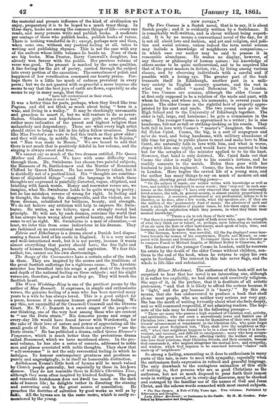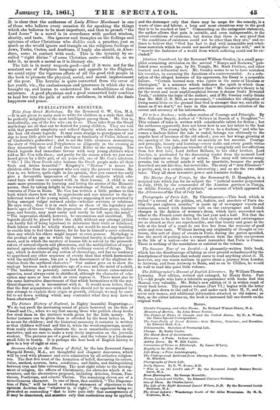2rEw wovnts.*
The Two Cosmos is a Scotch novel, that is to say, it is about Scotch people ; and it is evidently written by a Scotchman. It is remarkably well-written, and is clever without being superfi- cial. It is by no means a conventional novel of the day, for it is not all about love and fashion, and art and religion, and poli- tics and social science, unless indeed the term. social science may include a knowledge of neighbours and companions,— in which case our author may be said to pewee it in reasonable abundance. He makes no display, however, of any theory or philosophy of human nature : his knowledge of others seems to, be quite untheoretical, and to be acquired like that of the great masters in fiction, viz., by living, among various classes, and by observing individuals with a careful and if
possible with a loving eye. The greater part of the book transacts itself in Edinburgh, another part in a mili- tary society in English country quarters, and the rest in what may be called " moral Bohemian life " in London. The two Cosmos are cousins, although the elder Cosmo is at first only supposed to be a relation of the uncle and aunt, with whom he lives, and whose son, his namesake, is several years his junior. The elder Cosmo is the rightful heir of property appro- priated by his aunt and uncle. The two young men go to the High School and to the University of Edinburgh, together. The elder is tall, large, and handsome ; he gets a commission in the army. The younger Cosmo is apprenticed to a writer ; he is also handsome, but not so tall or striking-looking as his cousin. They both fall in love with Cosmo's " master's" daughter, the beauti- ful Helen Caird. Cosmo, the big, is a sort' of scapegrace and ne'er do weel, and being handsome, with military abundance of idle time for going to public places to meet and make love to Miss Caird, she naturally falls in love with him, and what is worse elopes with him one night, and would have been married to him i but for the scruples of the minister applied to to tie the knot. However, that bond is only deferred. Mr. Caird finds out that Cosmo the elder is really heir to his cousin's fortune, and he readily consents to the match. Helen then goes with her husband to join his regiment. Cosmo, the less, seeks his fortune in London. Here begins the envied life of a young man, and the author has many things to say on much of modern art and learning, showing great observing power-
" On the subject of music, our author writes with knowledge as well as love, and neither is displayed in many words ; they crop out' in such sen- tences as the following—' I have ever observed that upon this universally loved science, the talk, in general society, is almost exactly proportioned to the ignorance. A musician, professional or not professional, listens to it to discover, as he does, after a few words, what the speakers are ; if they are the million of the ' passionately fond of music,' the admirers of such and such a style, the whistlers of popular tunes, he lets them enjoy the corn, fortable enough satisfaction which they possess, in what they think their musical knowledge."
"'There a sin to rob them of their mite."
"But there is a numerous set of people of both sexes who, upon the strength of what they think ear or talent, or, perhaps, upon labouring an imitation of an air upon the flute or other instrument, must speak of keys, time, and harmony, and decide upon these, ere. &c." " The German, however, was merciful, till the fop displayed some inso- lence towards the names of his countrymen, Haydn and Mozart, as com- pared with Rossini and Donizetti. To compare them is as vile a blunder as to compare Fuseli to Michael Angelo, or Michael Kelley to Cimarosa, &c."
The fortunes of the younger Cosmo in London, until he recovers his estate by the death of the elder Cosmo without children, con- tinue to the end of the book, when he returns to enjoy his own again in Scotland. The interest in this tale never flags, and the whole is life-like and substantial.
.Lady Elinor Mordaunt. The authoress of this book will not be
surprised to hear that her novel is an interesting one, although it is rather too explicitly, we had almost said coercively religions. She says of it, in the preface, that it is destitute of all artistic pretension, "and that it is likely to offend the serious because it is light,' and the gay because it is heavy.' " By this she means, that she has endeavoured to produce a book that shall please most people, who are neither very serious nor very gay. She has the merit of writing fervently about what she feels deeply, and so will command respectful, if not admiring readers. The key- note of the tale may be found in the following passage— "There are many who possess a high standard of Christian zeal, activity, and spirituality, who yet erect a marvellously lower and limited one of Christian love ; many who create tests for themselves of their own and their friends' advancement or retardment in the Christian life, who quite forget the second great Scriptural test, Thou shalt love thy neighbour as thy- self, " when that neighbour happens to be in a class with whom it is incon- venient, and unusual, and difficult to amalgamate ; many who keep scrupu- lously all the great laws of love, affecting visibly the welfare of society, who love their relations, their Christian friends, and their enemies, because God commands it, who neglect altogether the mutual love, and sympathy, and wisdom, which God requires to be exercised between classes' each made up of neighbours.' "
So strong a feeling, arnonnting as it does to enthusiasm in many parts of this tale, is sure to meet with sympathy, especially when the enthusiasm finds expression in refined and graceful language. The only drawback to the contagious animation of this style of writing is, that persons who are as good Christians as the authoress, but not so much disposed to pour forth their inmost souls in writing a novel, or in every-day discourse, may be shocked and outraged by the familiar use of the names of God and Jesus Christ, and the solemn words connected with most sacred subjects.
• The Ttoo Coenios. A Tale of Fifty Years Ago. Two Toluntes. Published by Edmonton and Douglas. Lady Elinor Mardaunt ; or Sunbeams in the Castle. By M. Y. Gordon. Pub- lished by Bdausaston and Douglas.
It is clear that the authoress of Lady _Elinor Mordaunt is one of those who believe every occasion tit for speaking the things which she believes to be most important, and that to preach " the Lord Jesus" in a novel is in accordance with perfect wisdom, charity, and taste. She ignores and tramples on the feelings and opinions of other Christians who dislike such a practice, just as touch as she would ignore and trample on the religious feelings of Jews, Turks, Cretes, and Arabians, if haply she should, in. Aber- deen, come in contact with such. This is the tyranny by so- called " right divine "'of some Christian sects—which is, as we take it, as much a moral as it is literary sin.
The tale is in many respects good—and if it were not for the constant use of Scripture language and appeals to the Highest, we could enjoy the vigorous efforts of all the good rich people in the book to promote the physical, social, and moral improvement of the poor. The heroine is quite converted from the error of her youth, viz., the exclusiveness and ignorance in which she was brought up, and learns to understand the unhealthiness of that existence. A good' physician and a good unmarried lady combine to lead her into the path of active usefulness, in which she finds happiness and peace.



























 Previous page
Previous page